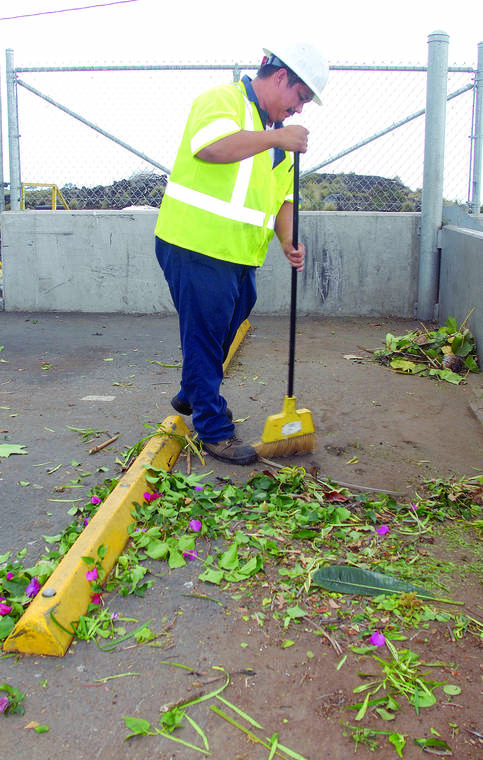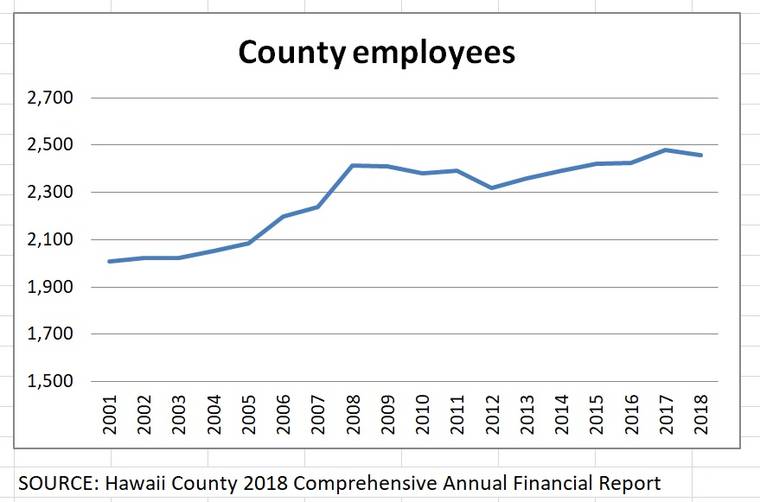County departments seek 51 more positions
HILO — If department heads had their way, there would be 51 new positions added to the county workforce on top of the 72 already proposed by Mayor Harry Kim.
But the final budget Kim will send to the County Council on Friday will contain just a fraction of that. The final proposed budget, which will likely be amended by the council before it goes into effect July 1, will likely include just three new positions in addition to the 72 already proposed.
Kim said Tuesday his plans so far are to add the three positions — vehicle registration licensing clerks for Kona, Waimea and Pahoa. The Finance Department had requested five clerks, plus three positions in its Real Property Tax Division.
Kim said people have long complained about the lines and wait time at the vehicle registration offices, and he felt the additional employees are warranted there. But there isn’t enough money to give departments everything they asked for, he said.
Property tax revenue is anticipated to be less than originally thought, Kim said, and he will “absolutely not” seek to raise property tax rates. The increase in property tax revenues will come from an increase in property values.
“We’re operating on a lower projection,” Kim said. “The increase was far less. The flexibility is going to be much less.”
Kim’s push to have the state Legislature allow more flexibility in using the county general excise tax surcharge has failed, so that $50 million in new money must be earmarked for roads, mass transit and trails, under state law. The Legislature also failed to change the counties’ share of the transient accommodations tax on hotels and short-term rentals, so that amount remains capped for the county at $19.3 million.
The majority of the proposed new hires, 42 in all, are for the Police Department. That was Kim’s priority after hearing numerous citizen complaints about crime. Their salaries and benefits will come from the general fund, which is backed mostly by property taxes.
Other new positions are in the Mass Transit Agency, Planning Department, Parks and Recreation and Environmental Management.
The county as of June 30 had 2,457 full-time equivalent employees, down slightly from the 2,479 the year before, according to its comprehensive annual financial report.
The $573.5 million preliminary budget includes $26.1 million in additional salaries, wages and benefits, most due to state-level collective bargaining agreements and mandated contributions to retirement funds. About two-thirds of the county budget is eaten up in employee salaries, benefits and retirement.
Departments had asked for clerks, administrative assistants, computer specialists, custodians, groundskeepers and other positions, in addition to millions of dollars in technology, furniture and vehicles on their wish lists.
This is the first time in years — if ever — that the County Council was privy to the departments’ budget requests to the mayor in addition to getting the mayor’s budget that takes those priorities into account.
Council Chairman Aaron Chung, who requested the documents from the mayor and subsequently made them public, said the council is finding the department budget requests very helpful as it works to help craft the 2019-20 budget.
“We’re able to have a more focused discussion than in years past,” Chung said. “Now we’re able to see not only what the immediate requests were but we have a more long-term look. It’s very helpful that we have a more fundamental view of the budget because we had more information from the administration.”
Many of the new positions are associated with new funding sources, such as 10 wastewater employees who will be paid partly by an increase in sewer fees and seven planners and plans checkers to be hired to handle vacation rental applications and paid by the fees and fines the department plans to collect.
“It looks like a good percentage of these positions are justified,” Chung said, “but the last thing we want to do is expand the size of government. We shouldn’t take (the new revenues) as a signal that we should expand government. If the economy goes sour, if revenues start to dwindle, then we get in trouble.”
Department heads aren’t that thrilled about going hat in hand to the mayor and council for what they see as essential personnel.
“We’re not fat. We don’t have people sitting around with nothing to do,” said Environmental Management Director Bill Kucharski. “If we request someone, it’s because we need that person. We try not to make frivolous requests.”






